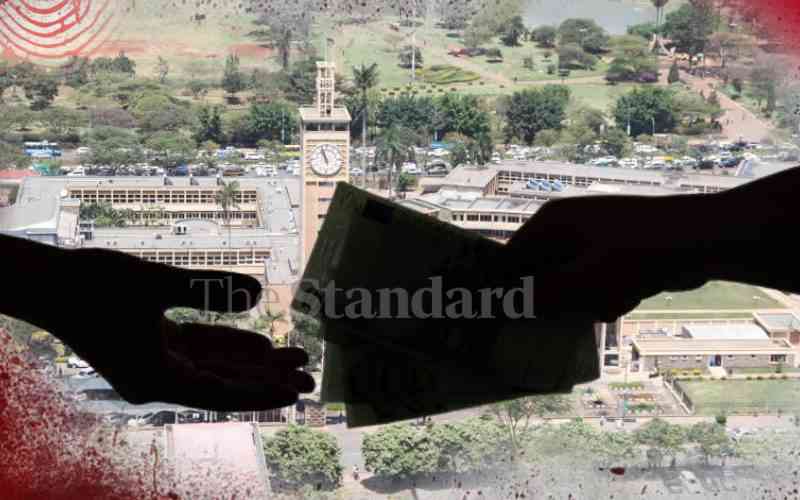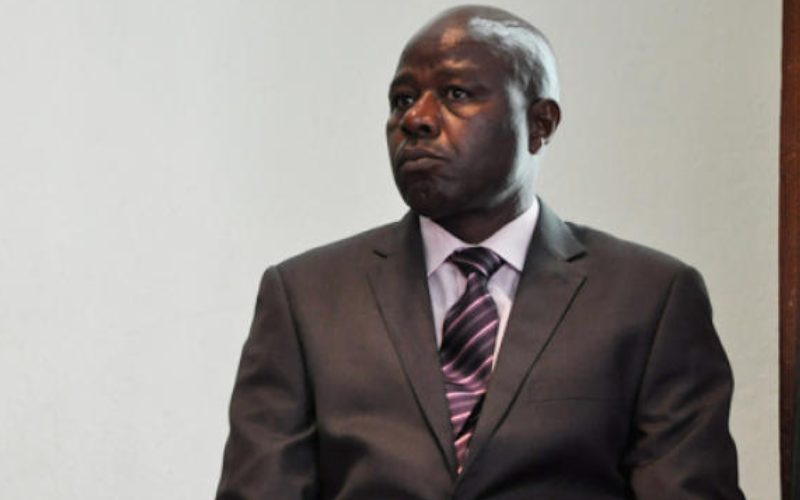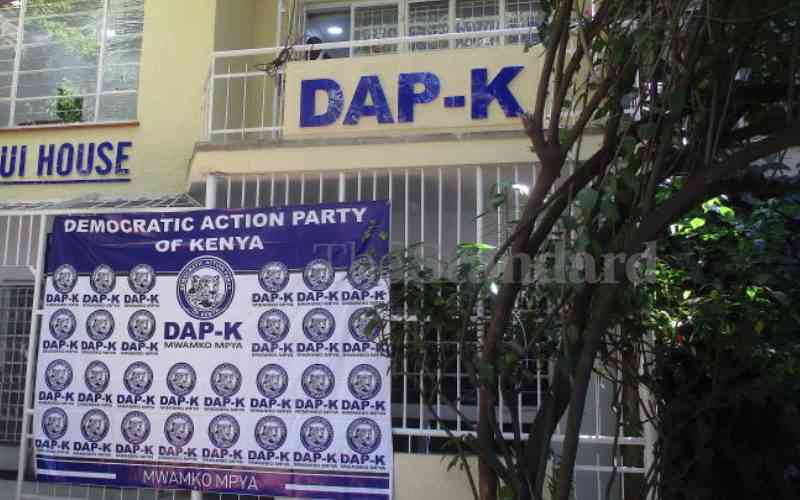
After a rigorous political winnowing process, the dust is settling from the commotion caused by publication of the political parties' nomination lists for various seats by the electoral commission.
The unholy ingredients of money, sex and bloodline were major determinants in securing party nomination to Parliament or the County Assembly.
The nomination process by various political parties, it has emerged, has become an auction where prospective nominated MPs part with as much as Sh1 million with some offering as high as Sh70 million to party leadership.
And on account of this skewed nomination, girlfriends, boyfriends, relatives and cronies bagged the coveted slots for nomination, which the Independent Electoral and Boundaries Commission had initially rejected. Some 45 political parties had submitted their lists.
Loyalists, party officials as well as MPs who lost in primaries or were prevailed upon to step down in favour of other candidates, had dominated the list submitted by President Uhuru Kenyatta's Jubilee party, Deputy President William Ruto's United Democratic Alliance (UDA), Raila Odinga's ODM, Kalonzo Musyoka's Wiper, Musalia Mudavadi's ANC and Moses Wetangula's Ford Kenya - gobbling up space reserved for special interest groups.
Multiple sources who spoke to The Standard, including those on the final list and others privy to the process - painted an exercise marred with diverse interests from people in powerful positions and desperation from those eyeing the nomination slots in county assemblies and parliament.
"We have authentic reports of people who paid money to secure nomination slots while others nominated their girlfriends and relatives. This is evidenced by some names of people with questionable character featuring on that list alongside people who have never done anything for the parties but somehow secured nominations," said Prof Edward Kisiangani, a political pundit.
The fact that no one glances at the list, except IEBC, makes the matter worse leading to blackmail, underhand dealings and corruption.
In one of the major political parties, a fairly unknown businessperson turned the tables on the veterans who had struck deals with party leadership, emerging number two in the official list of nominees to the national assembly.

The nominee is a business associate of the party's National Election Board (NEB) and donated a fleet of branded Prados which features in their coalition's presidential candidate convoy. Not only do the nominee and their associates fuel the fleet, but they also pay the combat-donning muscle men who man them.
Another nominee picked by his party to represent minority groups was listed as number 3 on a major party list. He comes from a marginalized area but his community is exponentially expanding, with considerable acumen in business.
His father who owns a chain of thriving business enterprises spread across the country donated a cool Sh70 million to the party's presidential campaign. The party leadership did not have much choice than to return the favour, attracting quiet jeers at those who did not know of the transaction.
"My party leader is a dealer, not a leader. He has played me," said one of the nominees in this particular party list.
In other instances, the strategic location of some of the nominees came into play. A businessman who operates in one of the most volatile towns secured for themselves and the business community of that area a nomination to a major party.
This was in return for the community support for the party. In a case of blood being thicker than water, a 62-year-old cousin of a spouse of a top party honcho beat known names to emerge in position seven on one of the party lists.
In a similar case of family ties, the first nominee to the Nairobi county assembly of a party which has considerable support in the city is a sister-in-law to the party honcho. Besides, the nominee is a repeat nominee having featured in a similar position in the 2017 general election.
A nominee for the MP position from the Democratic Action Party-Kenya (DAP-K), who spoke on condition of anonymity, said the process was marred with nepotism and rewarding of political cronies.
This, he said, was a red flag picked up by the Wafula Chebukati-led electoral agency which ultimately ordered the re-submission of the party's list.
"It wasn't until the order by IEBC for a new list that I found myself on the list based on merit. The second time around, the party had no option but to nominate people based on membership and contribution to the party as required by law," he said.

In the last Parliament, a youthful Senator was nominated following the influence of another long-serving MP on condition that the nominee surrendered half his pay to his political godfather. The nominee finished his term in without making any contribution during debates.
The youthful senator from one of the largest political parties was rarely present at the chambers and neither was he active in political circles.
An ODM legislator said some people nominated to Parliament were unaware of their roles and only earned their positions based on their closeness or relations with some influential politician.
Kisiangani said he had reports that some beneficiaries had to part with as much Sh500,000 to Sh1 million to secure the same. In one instance, a city tycoon paid Sh7 million for his son to be nominated.
"We need people representing special interests groups being nominated to Parliament. I am sorry that in the past and in present cases most of those nominated are only representing personal interests," said the MP.
Another nominee from an Azimio-affiliated party was left dejected despite being nominated for a Senate seat because the parent party is not fielding any senatorial candidate on August 9.
"It is a white lie," the source said. "You have to win seats in the electoral position in which you intend to nominate people."
The source said they had requested to be nominated into the National Assembly courtesy of their closeness to the party leader.
"I did not have to part with money," he went on, saying that "hot cake" nominations offered by big parties that are sure of bagging multiple seats could attract a "fee".

Party officials and long-term associates of party leadership abundantly featured in the final list by IEBC. The major parties did not want to take chances on the lists, ensuring their top officials who featured in the preparation and submission of lists, came number one in their respective lists.
Others are repeat nominees who despite being politically propelled with a free seat for the last five years, getting the requisite exposure and experience, did not bother to throw their hat in the ring this time round.
Kisiangani now insists all political parties failed in their mandate and did not get it right in the nomination process. This is because they do not have a proper framework to guide who should be nominated for those positions.
"...the registrar of political parties and IEBC reject that list until the parties get everything right," he added.
Dismus Mokua, a Political commentator, was disappointed by the fact that instead of the political parties' nomination list reflecting the parties' priorities and legislative agenda, it reeked of nepotism, favouritism and greed.
"The nomination list composition suggests that party leaders rewarded loyalty, family and friends and did not necessarily pick talent from special interests groups like trade unions, civil society, business and corporate leaders, marginalised communities and persons with disabilities," said Mokua.
The political analyst insists that there is a case for persons with special talent and skills to join political parties and attract party leaders' attention to increase the probability of getting nominated with folks who deserve such nominations tending to give party politics a wide berth.
A number of people disatisfied with the lists are planning to move to the IEBC tribunal.
 The Standard Group Plc is a multi-media organization with investments in media
platforms spanning newspaper print
operations, television, radio broadcasting, digital and online services. The
Standard Group is recognized as a
leading multi-media house in Kenya with a key influence in matters of national and
international interest.
The Standard Group Plc is a multi-media organization with investments in media
platforms spanning newspaper print
operations, television, radio broadcasting, digital and online services. The
Standard Group is recognized as a
leading multi-media house in Kenya with a key influence in matters of national and
international interest.









